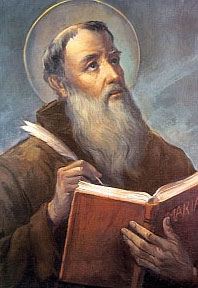
Feastday: July 21
Patron: of Brindisi
Birth: 1559
Death: 1619
Caesare de Rossi was born at Brandisi, kingdom of Naples, on July 22nd. He was educated by the conventual Franciscans there and by his uncle at St. Mark's in Venice. When sixteen, he joined the Capuchins at Verona, taking the name Lawrence. He pursued his higher studies in theology, philosophy, the bible, Greek, Hebrew, and several other languages at the University of Padua. He was ordained and began to preach with great effect in Northern Italy. He became definitor general of his Order in Rome in 1596, a position he was to hold five times, was assigned to conversion work with Jews, and was sent to Germany, with Blessed Benedict of Urbino, to combat Lutheranism. They founded friaries at Prague, Vienna, and Gorizia, which were to develop into the provinces of Bohemia, Austria, and Styria. At the request of Emperor Rudolf II, Lawrence helped raise an army among the German rulers to fight against the Turks, who were threatening to conquer all of Hungary, became its chaplain, and was among the leaders in the Battle of Szekesfehevar in 1601; many attributed the ensuing victory to him. In 1602, he was elected Vicar General of the Capuchins but refused re-election in 1605. He was sent to Spain by the emperor to persuade Philip III to join the Catholic League, and while there, founded a Capuchin house in Madrid. He was then sent as papal nuncio to the court of Maximillian of Bavaria, served as peacemaker in several royal disputes, and in 1618, retired from worldly affairs to the friary at Caserta. He was recalled at the request of the rulers of Naples to go to Spain to intercede with King Philip for them against the Duke of Osuna, Spanish envoy to naples and convinced the King to recall the Duke to avert an uprising. The trip in the sweltering heat of summer exhausted him, and he died a few days after his meeting with the King at Lisbon on July 22nd. Lawrence wrote a commentary on Genesis and several treatises against Luther, but Lawrence's main writings are in the nine volumes of his sermons. He was canonized in 1881 and proclaimed a Doctor of the Church by Pope John XXIII in 1959. His feast day is July 21st.
Jewelry Sale 15% OFF
FREE Shipping over $60
Roman Catholic priest and a theologian
| This article needs additional citations for verification. (July 2018) |
Lawrence of Brindisi (22 July 1559 – 22 July 1619), born Giulio Cesare Russo, was a Roman Catholic priest and a theologian as well as a member of the Order of Friars Minor Capuchin. An accomplished linguist, in addition to his native Italian, Lawrence could read and speak Latin, Hebrew, Greek, German, Bohemian, Spanish, and French fluently. Lawrence was ordained a priest at the age of 23. Lawrence was beatified on 1 June 1783 and canonized as a saint on 8 December 1881.
Biography
Giulio Cesare Russo was born in Brindisi, Kingdom of Naples, to a family of Venetian merchants. After the early death of his parents, he was raised by his uncle and educated at Saint Mark's College in Venice. Cesare joined the Capuchins in Verona as Brother Lawrence. He received further instruction from the University of Padua. An accomplished linguist, in addition to his native Italian, Lawrence could read and speak Latin, Hebrew, Greek, German, Bohemian, Spanish, and French fluently. Lawrence was ordained a priest at the age of 23.
At the age of thirty-one, Lawrence was elected superior of the Capuchin Franciscan province of Tuscany. He was appointed definitor general to Rome for the Capuchins in 1596, where Pope Clement VIII assigned him the task of preaching to the Jews in the city. He was so proficient in the Hebrew language that rabbis assumed he had been a convert from Judaism. Beginning in 1599, Lawrence established Capuchin monasteries in modern Germany and Austria, furthering the Counter-Reformation and bringing many Protestants back to the Catholic faith.
In 1601, he served as the imperial chaplain for the army of Rudolph II, Holy Roman Emperor, and successfully recruited Philippe Emmanuel, Duke of Mercœur, to help fight against the Ottoman Turks. He then led the army during the siege of Székesfehérvár in Hungary from the Ottoman Empire, armed only with a crucifix.
In 1602, he was elected vicar general of the Capuchin friars, at that time the highest office in the Order. He was elected again in 1605, but refused the office. He entered the service of the Holy See, becoming papal nuncio to Bavaria. After serving as nuncio to Spain, he retired to a monastery in 1618. He was recalled as a special envoy to the King of Spain regarding the actions of the Viceroy of Naples in 1619, and after finishing his mission, died on his birthday in Lisbon.
He was entombed at the Poor Clares' Convento de la Anunciada (Convent of the Annunciation) in Villafranca del Bierzo, Spain.
Favourite blessing
|
Nos cum prole pia |
Mary, with Her loving Son, |
Veneration
He was beatified in 1783 by Pope Pius VI and was canonized in 1881 by Pope Leo XIII.
Works
St. Lawrence of Brindisi Complete Works were published in 15 volumes, in a critical edition, between 1926 and 1956. They comprise:
- Mariale
- Lutheranismi hypotyposis
- Explanatio in Genesim
- Quadragesimale primum
- Quadragesimale secundum
- Quadragesimale tertium
- Quadragesimale quartum
- Adventus
- Dominicalia
- Sanctorale
- Sermones de tempore
His original manuscripts comprise 13 volumes in parchment and are located at the Archivio dei Cappuccini di Mestre.





